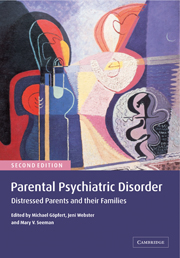Book contents
- Frontmatter
- Contents
- List of contributors
- Foreword
- Preface
- Part I Basic issues
- Part II Comprehensive assessment and treatment
- Part III Specific disorders: the impact on parent–child relationships
- 11 Schizophrenia and motherhood
- 12 When a parent suffers from an affective disorder: effect on the child
- 13 Alcohol and drug problems in parents: an overview of the impact on children and implications for practice
- 14 When mothers abuse drugs
- 15 Personality disorder in parents: developmental perspectives and intervention
- Part IV Specific treatments and service needs
- Part V Child-sensitive therapeutic interventions
- Part VI Models for collaborative services and staff training
- Afterword
- Index
- References
11 - Schizophrenia and motherhood
from Part III - Specific disorders: the impact on parent–child relationships
Published online by Cambridge University Press: 09 August 2009
- Frontmatter
- Contents
- List of contributors
- Foreword
- Preface
- Part I Basic issues
- Part II Comprehensive assessment and treatment
- Part III Specific disorders: the impact on parent–child relationships
- 11 Schizophrenia and motherhood
- 12 When a parent suffers from an affective disorder: effect on the child
- 13 Alcohol and drug problems in parents: an overview of the impact on children and implications for practice
- 14 When mothers abuse drugs
- 15 Personality disorder in parents: developmental perspectives and intervention
- Part IV Specific treatments and service needs
- Part V Child-sensitive therapeutic interventions
- Part VI Models for collaborative services and staff training
- Afterword
- Index
- References
Summary
In the first edition of this book, I used case examples to illustrate how women with schizophrenia, because of illness, have difficulty with tasks of parenting such as nurturing independence, establishing intimacy, enhancing growth through stimulation, modelling appropriate social habits and communicating effectively (Seeman, 1996). Since then, much new research has emerged and broader questions can now be addressed:
How many women with schizophrenia become parents? How many actually bring up their children? In other words, what are the dimensions of the potential problems that the conjunction of motherhood and schizophrenia poses?
What is the subjective experience of these mothers? How important is the parenting role to them as individuals and how do they perceive the assistance they receive in fulfilling that role?
What determines parenting capacity and how and when should assessments be done?
What are the mental health outcomes in children of mothers with schizophrenia, whether reared with or reared away from their mothers?
What is the subjective experience of these children?
Does schizophrenia impact differently at different stages of a child's life and/or at different phases of the mother's illness?
How can psychiatric services best assist mothers with schizophrenia?
Scope
Van Bussel undertook a survey of the total population of a community inner city programme for schizophrenia in Toronto, Canada (Van Bussel, pers. comm.). Fifty-one women attended the programme. Seventeen were interviewed and information about the others was obtained from their case managers. Twenty-seven of the women (53%) had had at least one full-term birth.
- Type
- Chapter
- Information
- Parental Psychiatric DisorderDistressed Parents and their Families, pp. 161 - 171Publisher: Cambridge University PressPrint publication year: 2004
References
- 10
- Cited by

